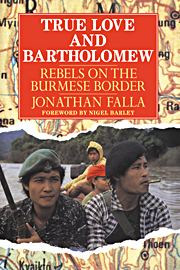Book contents
- Frontmatter
- Contents
- List of illustrations
- Foreword
- Preface
- Acknowledgments
- 1 A bronze drum
- 2 Boar Tusk's children
- 3 White collar Flowerland
- 4 True Love at home
- 5 Water child, land child
- 6 A simple man
- 7 Fighting mean, fighting clean
- 8 Great Lake and the Elephant Man
- 9 Bartholomew's boarders
- 10 The three seasons
- Interlude: from the Kok river
- 11 Last of the longhouses
- 12 A delicate bamboo tongue
- 13 True Love in love
- 14 Fermented monkey faeces
- 15 Perfect hosts
- 16 Old guard, young Turks
- 17 True Love and White Rock
- 18 Insurgents in a landscape
- 19 True Love and sudden death
- 20 Portraits
- Notes
- Bibliography
- Index
Foreword
Published online by Cambridge University Press: 28 October 2009
- Frontmatter
- Contents
- List of illustrations
- Foreword
- Preface
- Acknowledgments
- 1 A bronze drum
- 2 Boar Tusk's children
- 3 White collar Flowerland
- 4 True Love at home
- 5 Water child, land child
- 6 A simple man
- 7 Fighting mean, fighting clean
- 8 Great Lake and the Elephant Man
- 9 Bartholomew's boarders
- 10 The three seasons
- Interlude: from the Kok river
- 11 Last of the longhouses
- 12 A delicate bamboo tongue
- 13 True Love in love
- 14 Fermented monkey faeces
- 15 Perfect hosts
- 16 Old guard, young Turks
- 17 True Love and White Rock
- 18 Insurgents in a landscape
- 19 True Love and sudden death
- 20 Portraits
- Notes
- Bibliography
- Index
Summary
The names of most areas of the world elicit a simple but powerful response in the minds of anthropologists. Each bears the burden of a particular specialisation. Australia ‘means’ art and kinship, Africa lineages, witchcraft and magic, India castes and religion. Largely this is because classic texts of the past have burned these associations into the heads of generations of students.
It is the misfortune of Burma to ‘mean’ politics. Students of anthropology cut their teeth on the politics of Burma, but a politics reduced to abstract systems that permit a sort of detached overview. There are no people in such systems, just a faceless interplay of forces and models that swing back and forth suspended in a sort of idealised time.
In True Love and Bartholomew, Jonathan Falla offers us the human face of political change in contemporary Burma, a behind-the-lines view of the Karen Free State. It is a place at once very real yet almost imaginary, a place unrecognised or rather wilfully forgotten by the outside world, a mountain enclave continuing a struggle with lowland Burma that is older than any of its people know. Used against the Burmese and Japanese then swiftly abandoned by the colonial British, ‘won’ for Christ by missionaries, the Karen are currently fighting for their identity and their very lives. This is not an adventure story, for the bloody battles with the Burmese, the rapes and tortures suffered at their hands are off-scene and merely rumble in the distance like stage thunder. We encounter them as memories or consequences.
- Type
- Chapter
- Information
- True Love and BartholomewRebels on the Burmese Border, pp. xi - xivPublisher: Cambridge University PressPrint publication year: 1991



